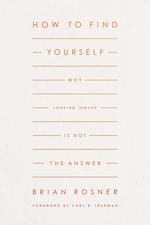 How to Find Yourself: Why looking inwards is not the answer
How to Find Yourself: Why looking inwards is not the answer
REV DR BRIAN S. ROSNER
Crossway, 2022
REVIEWED BY KAREN HALE
In his previous book Known by God A biblical theology of personal identity (2017) Brian Rosner (Principal, Ridley College) outlines a compelling argument for our identity being directly linked to being known by God. This latest book is a more accessible account exploring our identity and the question ‘Who am I? In the west the answer to this question is solved by looking inward. Rosner critiques this way of working out our identity and explores the many short comings of this view. He then seeks to provide an alternative of seeing our identity not primarily from within but by looking upwards to God. This view of looking inward is called expressive individualism. It stresses that if you want to know yourself and be happy then you need to look inward. Personal freedom is prized above all else and we should celebrate everyone’s quest for self-expression. The positives of this view are briefly outlined by Rosner before addressing a thoughtful critique.
The question of identity is not new but the markers that we use to express our identity have changed significantly over the last 50 years. Today we use fewer identity markers to describe who we are. Rosner challenges us to ask 5 important questions of expressive individualism. Does it help us deal with suffering, our pride, the poor and weak, injustice and our happiness. Rosner argues that this way of finding our identity is both fragile and faulty.
By looking at some ancient Biblical texts Brian Rosner explores how we have seen the fragility and faults of humans in seeking to look within to define their identity. In the story of Adam and Eve we find humans thinking they can work out their own path and that they know best. This has terrible consequences, and it is only in looking at Jesus that we finally see a human who is tempted to trust themselves and yet trusts God. Even though today we are told to look inward, Rosner rightly identifies that this is not the full view. We have never been more obsessed with looking around us. Through social media, in particular, we compare and contrast ourselves to everyone else. Rosner suggests that the missing piece we are yearning for is looking upwards. True identity is beyond us. He suggests that we are a social story telling beings that want to worship. From when we are babies to the end of life we live in society and are shaped by all the relationships that we have. To know yourself you need to be known. Known by others but more importantly known by God.
Rosner contends that today the narrative that we inhabit is secular materialism. Historically this has come from the enlightenment, a story of progress, freedom from the dark past. We then had the sexual revolution, a story of freedom for pleasure. Now we see the story of consumerism, we are what we buy. This seems to tap into financial security and enjoyment. All these stories have failed us, as they do not take seriously the impact of personal freedoms nor the capacity of humans to do harm. There has been some acknowledgement of these pitfalls and so another story has emerged that highlights social justice. This is a strong voice at present. It is a very black and white view of social justice and fails to take into account the complexity of many issues.
In contrast to secular materialism Brian Rosner offers a positive way forward. We are part of a bigger story, God’s story, which is particularly seen in Jesus’ story. He then asks the same questions of this view. Can this help us with suffering, our pride, the poor and weak, injustice and happiness. We don’t just believe God’s story we inhabit this story.
The final part of the book looks at how to live within this story. It is a paradox that you are told to lose yourself to be able to find yourself. We don’t look in, but to Christ to truly find ourselves. We are encouraged to trust in Jesus and to immerse ourselves in his story, a story with love at the centre.
I highly commend this book as it seeks to help us engage with the complex issue of our identity. In a world that currently has fewer identity markers and yet espouses greater freedom that does not seem to deliver. Identity crisis seems to be occurring at every age today from children to the elderly. The story we have been sold of expressive individualism doesn’t seem to be delivering on the freedoms it seems to promise. Instead, people are more confused than ever. Brian Rosner provides a compelling case for seeing our identity within God’s story. The story of the good news of Jesus. It is a bigger story beyond ourselves but one in which we get to live. We are part of this narrative, and it is a story that is rooted in love. To be truly known and loved by God gives us an identity that is able to withstand the complexities of life.
Karen Hale is Teacher of Religious Education and Science at Ivanhoe Girls’ Grammar School.
